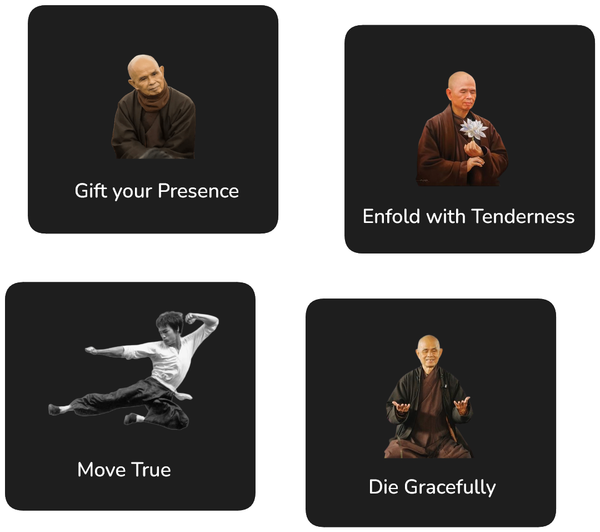Eight Virtues Which Seem Not All That Bad

Virtue seems like a dusty old concept which fits in an 18th century - but not in our modern digital age. I disagree! I believe the problem with virtues is not the concept as such but the particular virtues we have long aspired to.
Virtues, however, are a key pillar of leading happy and meaningful lives since they provide a shortcut to meaning; rather than having to ponder the nature of existence in our every waking moment, we can fall back to a handy list of virtues to guide our decisions; assuming the more we follow these, the more meaningful our lives may become.
I have recently written about six virtues which were identified by positive psychologists. Thinking about virtues in a scientific setting is a very laudable exercise and can lead to tremendous insights. However, I personally found the list of virtues lacking in some respects. So based on the original six virtues proposed I have composed my own list of desirable virtues:
Being wise
Being wise to me means having found effective ways to cultivate a calm and peaceful mind within the chaotic and nonsensical world around and within us.
I don't think that being knowledgeable is a prerequisite for this. Of course, knowledge might be one possible way to achieve wisdom but it might just as well be a path which leads us astray from it; see Dr Faust.
Working hard for the benefit of others
It's the sad truth of our life; humanity needs to labour in order to survive and working on something with a purpose seems to be one of the things which makes us happy. Therefore I think that working for the benefit of others is a good virtue to aspire to.
Being kind, loving, understanding and cooperative
This is the virtue we need to seek in every moment we are not alone. The moment we share our space with another sentient being, we need to show them kindness and love and make a real effort to understand them deeply. Being cooperative means that we should strive to seek the benefit of a group when we are part of it, such as our family or a team at work.
Being public spirited
In the early 20th century, the idea of the public good was something which was often discussed. Nowadays I feel it is sometimes considered a somewhat dated concept. However, when looking through some immigration forms for Australia I found the following statement which needs to be signed by all applicants for permanent immigration:
Australian society values respect for the freedom and dignity of the individual, freedom of religion, commitment to the rule of law, Parliamentary democracy, equality of men and women and a spirit of egalitarianism that embraces mutual respect, tolerance, fair play and compassion for those in need and pursuit of the public good;
I think there is very little to disagree with here. A society can only function if protects those with little power, seeks equality and focuses its efforts on increasing public good; rather than being designed to serve the needs of particular individuals or organisations. Sadly the idea of public good often ends at the border of our nation states; since true public good can only be achieved when we consider all of mankind.
Being grateful and forgiving
Gratefulness is a powerful force to enable our happiness. To be grateful to others, for the blessing of existence, the beauty of nature and other things does no one harm and plenty of good to ourselves, so we should do it at every opportunity.
I think that forgiveness is often a prerequisite to gratefulness. If we are hurt by the actions of another, it is difficult to feel gratefulness towards them. Likewise, if we disdain the very fact of our existence: that it seems so meaningless and futile, we cannot be grateful for the beauty of the world and for the very gift that we exist at all. However if we find the strength to find forgiveness, often gratitude comes washing over us naturally.
Being just
Many experiments have shown that we have a natural dislike for injustice. Thankfully justice does plenty of good for the working of a group and a society. Thus this is something we should foster and seek ourselves not just to demand justice of others but also be just in our own actions. (Which is challenging since our love for justice as a general principle is often clouded by our love for our own advantage.)
It must be noted here that being 'just' is also much easier said than done. What constitutes justice is often difficult to determine - in fact, it is a question which keeps millions of lawyers occupied. However, that achieving true justice - or at least something close to it - is very difficult should be no detriment to try; we need to keep in mind our own limitations and be very careful not to let our biases guide us in determining what is just.
Being parsimonious
It should be no secret to anyone who has spent any time following the latest trends in the study of happiness that seeking material possessions is no path to happiness. Granted, spending money on experiences seems to be preferable to spending money on things. However, using as little resources as possible for the satisfaction of ones needs and desires has many benefits. First and foremost, it frees up resources for those who are struggling to make ends meet; also, usually spending something enlarges our impact on the environment. Lastly, for most of us, money must first be earned before it is being spent, and working for money is something many do not enjoy.
Seeking deeper meaning
I started this article with the promise that virtues might free us from the toil of having to ponder the deeper meaning of life. However, I think that thinking deeply about life and its meaning is an essential virtue which can lead to great happiness - following predefined virtues can only get us that far.
Some approaches of how to do this and some fundamental deliberations will be discussed here in future articles. However, I believe that each one of us has the capacity to explore the question of the meaning of life without any help; as long as we set our mind to it and not ignore this potentially challenging question in the calming buzz of our everyday lives.
Are these eight virtues listed here the best virtues to adopt for a happy and purposeful life? I would not know and I doubt they are. However, I think they provide a good starting point to consider the role we would like virtues to play in our lives and provide some context to the idea of being virtuous - it is not simply something which we are or aren't but is dependent on the particular things we value; and how successful we are in living our values in our everyday lives.
Featured image: Wikimedia





